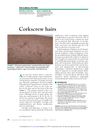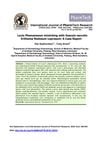 3 citations,
February 2022 in “Journal of the American Academy of Dermatology”
3 citations,
February 2022 in “Journal of the American Academy of Dermatology” Black patients with a specific type of hair loss have a much higher chance of lacking enough vitamin D.
 3 citations,
April 2021 in “Cureus”
3 citations,
April 2021 in “Cureus” Low Vitamin D is common in people with Alopecia Areata, but its impact on the condition needs more research.
 3 citations,
April 2015 in “Cleveland Clinic Journal of Medicine”
3 citations,
April 2015 in “Cleveland Clinic Journal of Medicine” The woman has scurvy and needs more vitamin C.
 2 citations,
May 2020 in “Giornale italiano di dermatologia e venereologia”
2 citations,
May 2020 in “Giornale italiano di dermatologia e venereologia” Vitamin D and its receptor are important for hair and scalp health and may help treat hair loss.
2 citations,
December 2018 in “Қазақстанның клиникалық медицинасы” Higher Vitamin-D levels may help treat certain types of hair loss.
 1 citations,
September 2022 in “Journal of dermatological science”
1 citations,
September 2022 in “Journal of dermatological science” Certain vitamins and their derivatives can help hair grow longer by activating specific growth signals.
 1 citations,
January 2021 in “Journal of Dermatology and Dermatologic Surgery”
1 citations,
January 2021 in “Journal of Dermatology and Dermatologic Surgery” Taking Vitamin D supplements may increase the risk of skin darkening after laser hair removal.
1 citations,
January 1980 in “Side effects of drugs annual” Taking too much vitamin A can cause health problems like bone pain and hair loss.
 January 2025 in “Egyptian Journal of Dermatology and Venerology”
January 2025 in “Egyptian Journal of Dermatology and Venerology” COVID-19 vaccination may lower vitamin D levels and cause hair loss.
 January 2024 in “Journal of advanced research in Medical and Health science”
January 2024 in “Journal of advanced research in Medical and Health science” People with severe and long-lasting alopecia areata often have low vitamin D levels, and treatments with vitamin D-like substances might help.
 November 2023 in “Cureus”
November 2023 in “Cureus” Most people in Jazan know about vitamin D, zinc, and ferritin's link to hair loss but don't practice enough preventive measures.
 September 2023 in “International Journal of Trichology”
September 2023 in “International Journal of Trichology” Oral Vitamin D can improve hair density and reduce hair loss in Telogen Effluvium patients.
May 2023 in “International journal of molecular sciences” The ABCA4 gene protects hair follicle stem cells from toxic vitamin A byproducts.
 March 2023 in “Photodiagnosis and Photodynamic Therapy”
March 2023 in “Photodiagnosis and Photodynamic Therapy” Low vitamin D levels are linked to severe and active alopecia areata.
 January 2023 in “International Journal of Contemporary Pediatrics”
January 2023 in “International Journal of Contemporary Pediatrics” A rare genetic disease causes rickets and often hair loss in young children, which can improve with specific treatments.
 December 2022 in “Journal of The American Academy of Dermatology”
December 2022 in “Journal of The American Academy of Dermatology” The authors maintain there is a significant link between vitamin D deficiency and central centrifugal cicatricial alopecia in Black patients, and call for more research on the topic.
 October 2022 in “Research, Society and Development”
October 2022 in “Research, Society and Development” Vitamins and minerals don't significantly affect hair loss treatment in patients with telogen effluvium.
 July 2021 in “Rossiiskii Zhurnal Kozhnykh i Venericheskikh Boleznei”
July 2021 in “Rossiiskii Zhurnal Kozhnykh i Venericheskikh Boleznei” Low vitamin D levels are linked to more skin problems.
 September 2020 in “International Journal of Research in Medical Sciences”
September 2020 in “International Journal of Research in Medical Sciences” People with alopecia areata had lower vitamin D levels, but these levels did not relate to how severe their condition was.
 October 2011 in “Dermato-endocrinology”
October 2011 in “Dermato-endocrinology” Hormones significantly affect skin health, with vitamin D playing a key role.
 January 2020 in “International Journal of PharmTech Research”
January 2020 in “International Journal of PharmTech Research” A man with severe leprosy developed painless ulcers and numbness, treated successfully with multiple drugs and vitamins.
February 2023 in “Journal of Cosmetic Dermatology” Combining microneedling with either vitamin D3 or bimatoprost improves hair regrowth more than microneedling alone.
276 citations,
April 2003 in “Molecular endocrinology” Vitamin D is important for bones, hair, blood pressure, and breast development.
166 citations,
February 2005 in “Behavioural brain research” Vitamin D receptor knockout mice have significant motor impairments but no cognitive deficits.
148 citations,
October 2008 in “The journal of investigative dermatology/Journal of investigative dermatology” Mice without the vitamin D receptor are more prone to UV-induced skin tumors.
139 citations,
September 2001 in “The journal of investigative dermatology/Journal of investigative dermatology” Mutations in the Vitamin D receptor gene can cause hair loss similar to mutations in the Hairless gene.
 128 citations,
January 2001 in “American Journal of Clinical Dermatology”
128 citations,
January 2001 in “American Journal of Clinical Dermatology” Coal tar shampoos, salicylic acid, and topical corticosteroids are effective for scalp psoriasis, with Vitamin D3 analogues also showing benefits; severe cases may require stronger medication with more risks.
 100 citations,
July 2018 in “Journal of The American Academy of Dermatology”
100 citations,
July 2018 in “Journal of The American Academy of Dermatology” People with alopecia areata often have other health issues like skin diseases, metabolic syndrome, stomach infections, lupus, anemia, thyroid problems, mental health issues, vitamin D deficiency, and hearing and eye problems.
78 citations,
November 2005 in “Endocrinology” Hairless protein can block vitamin D activation in skin cells.
 66 citations,
June 2018 in “British Journal of Dermatology”
66 citations,
June 2018 in “British Journal of Dermatology” European guidelines recommend regular eye and ear exams, skin care, vitamin D supplements, and cautious use of medications for managing congenital ichthyoses.





















